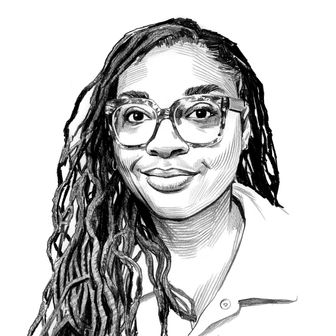
Tonight was a dull but educational episode that touched on many pertinent social issues, ending with Dr. Jackie enlisting the women to film a public service announcement about Black maternal mortality. Though obviously nowhere as necessary as raising awareness about health-care disparities, if I were to make a PSA of my own relating to this episode, I would use my experience recapping the last two seasons of The Real Housewives of Atlanta to discuss the dangers of eliminating strong personalities on reality TV casts without a foolproof plan to compensate for their absence.
Covering RHOA’s fall from grace has made me an expert in chronicling a show that’s digging its own grave; I am hyperaware of the signs and symptoms associated with losing a superstar presence. First, the diva’s absence is so loud it’s deafening; even without physically filming, their existence remains a main character, a source of both conversation and conflict. Then, as the show progresses into new story lines and the rest of the cast tries to carry on without their key player, almost like a phantom limb, the audience feels a constant twinge that something is missing. Married to Medicine is in the phantom-limb phase.
This show had a once-in-a-lifetime, written-in-the-stars core ensemble that was responsible for creating the show’s reputation as Bravo’s most popular sleeper hit. So my question is this: Whatever happened to “if it ain’t broke, don’t fix it”? Why couldn’t Quad have merely been banished from the rest of the Napa trip as punishment, with the women trying to pick up the pieces once they return to Atlanta? I would love a one-on-one sit-down with Toya and Quad, an emotionally charged reconciliation with Heavenly, or even solo scenes of Quad being delusional and shady with her other friends. I’m spitballing here, but I’m trying to say that I believe Quad is currently integral to the cast’s formula, and eliminating her was a wrong move, as proven by the last two episodes. I understand the ladies might be fed up with her antics, but we have a show to make here, people! Be fed up with her on-camera!
It’s evident by Quad’s imminent return, as hinted in the mid-season trailer, and the fact that no one bothered to remove her from the opening credits that the producers agree she’s needed for the show. But until she comes back or someone decides to wake up and clock in (looking at you, Phaedra), we have to truck through the women trying to prove they can hold it together without her. Excuse my weeks-long ruminations about the ousting of Quad, but the issue becomes more apparent the longer she’s gone, with the meat of the story lines being so boring and redundant that my mind can’t help but drift. There’s a lull in the energy as there’s not much happening interpersonally between the ladies, and their solo story lines aren’t captivating enough to carry this many episodes. We’ve seen enough of Miles and Michael’s new apartment (and their condoms), we’ve listened to Toya complain about Eugene ad nauseam, and we’ve sat through one too many boys’ nights revolving around talking about gender roles.
Without personal drama, production and the cast lean on the “medicine” aspect of the show’s premise in tonight’s episode, as the majority of the scenes take place at a doctor’s appointment of some type, whether it be at work with the doctors, during the Harris boys’ orthodontics consultation, or the Luncefords discussing Tea’s fibroids with a specialist. The resident doctors each tackle a social issue during their solo scenes: Jackie sticks to her fatphobia by prescribing someone semaglutide; Dr. Simone speaks to a patient about the possibility of crossing state lines for an abortion; and Heavenly treats TS Madison, a proud Black trans woman who helped the dentist open up her eyes to the discrimination trans individuals face. TS Madison, the TS standing literally for “transexual,” is a reality TV personality who bumps shoulders with many Atlanta socialites and trusts only Heavenly with her pearly whites.
During their session, Heavenly admits to being ignorant about trans culture before befriending TS Madison, who, at first, Heavenly thought was cis-gendered. At the appointment, TS Madison discusses her anger toward people of her own race — the same people who know discrimination the most intimately — for having transphobic tendencies. She breaks down how being trans is a part of her identity before stating that people are often afraid of what they don’t understand. My favorite part is when TS Madison debunks the dangerous, conservative belief that exposing young children to queerness in media will magically turn them queer. She says that, as a 45-year-old, she grew up with no trans representation yet still knew she was trans. I applaud Heavenly for not only being open about needing to educate herself but for using her platform as a way to spread the knowledge she learned.
Next, Dr. Jackie reminds us of her crusade against fatness as she prescribes her patient Chika semaglutide while nearly foaming at the mouth as she reads aloud her weight and BMI. Unless you’ve been living under a rock, I’m assuming you know what Ozempic is, and semaglutide is just the generic name for Ozempic. So, of course, Jackie is peddling it to the patients she believes are too fat. I phrase it that way because, although I doubt Jackie would ever admit it, the numbers that she’s using to determine her patients’ health in relation to their weight have been proven to be highly racialized. Over the summer, the American Medical Association finally admitted that the entire concept of a BMI is inherently racist, with roots leading back to eugenics. People outside of the white race were not considered by Ancel Keys when creating the BMI system, and the exemplar of healthiness was subjective to Keys’s biases (which the AMA describes as his preference for “white aesthetic priorities”), not concrete scientific evidence. The AMA article says that Keys described obesity as being “ethically repugnant” and “disgusting,” which sounds a lot like something Dr. Jackie would say behind closed doors (just look at her face after Chika said she overeats) when she’s not complaining about her patients’ anxieties over their pregnancy.
I know Chika did have alarmingly high cholesterol, but I would like to know what semaglutide has to do with obstetrics and gynecology and why an OB/GYN would be prescribing it, not a primary care physician. Simone is also putting her patients on semaglutide, as we see during her appointment with Rasheeda, who lost around 20 pounds while on the drug after Simone called her chubby. Rasheeda and Simone meet to discuss how her use of semaglutide factors into her desire to get pregnant, as she cannot be on the drug while trying to conceive. Since Rasheeda has already discontinued semaglutide, Simone moves on to other factors that could make pregnancy difficult. Due to Rasheeda’s age, there are chances of chromosomal abnormalities, which, unfortunately, opens the door to discussing the possibility of wanting to terminate the pregnancy. Since Georgia abides by the Heartbeat Bill, after the fetus develops a heartbeat, the mother no longer has autonomy over their body and cannot legally have an abortion in the state. Thankfully, Rasheeda has had these conversations with her spouse and is prepared to cross state lines if she chooses to make that decision.
The end of the episode bounces back and forth between the women filming Dr. Jackie’s Black maternal-mortality PSA and guys’ night with the husbands, where Kema, Dr. Alicia’s husband, decides to unleash all his pent-up misogynistic ideas about American women. The juxtaposition is jarring — somehow, we manage to take three steps forward with Simone calling out the archaic abortion laws in this country and the women highlighting health-care disparities, and three steps back with Kema aggressively proclaiming that women have too much power in America. Sure, we still statistically get paid less and sexually assaulted more than men, and even fetuses without any kind of gender or consciousness are considered before our well-being. And that’s before factoring in the intersectionality of being a Black American and a woman, but I guess we’ve taken things too far by wanting to have a say in our marriages.
Kema goes on and on about being castrated by having to treat women as human beings and not entities to control while the other men look on, probably making mental bets on how long his marriage will last. He compares American women to women in his home country, saying that in Nigeria, “if your woman is not listening to you, it makes you look like a weak man.” He says it’s time for men to “take back control,” which is a thinly veiled way of telling us to get back in our places. Eugene, the great man that he is, states the obvious about how women are still discriminated against and left at a disadvantage. Kema annoyingly puffs his cigar and proclaims men “don’t have a voice” and “everyone can’t lead together.” All I know is that I’d like to be led out of this conversation so we’re no longer subjected to the very loud voice this man claims not to have.
Doctor’s Orders
• Phaedra was barely in this episode, which is fine because her skills are being put to use on The Traitors, where Shady Phae Phae is unquestionably killing it. Shereé, a.k.a. She by She’s Happy to Have a Job, also cracks me up while looking lost and confused. No comment on Larsa Pippen-Jordan-Kardashian.
• Sorry to make this about myself, but I had the pleasure of writing this recap on my birthday, so I feel sentimental. Though I usually make it a rule to do zero work on my day, I don’t view this as work at all. In fact, bringing this show to Vulture was the highlight of my 28th year on this planet, and I am honored to go into my 29th writing about it. Thank you to everyone reading and my editors for supporting me; it’s the best birthday present I could ask for.


